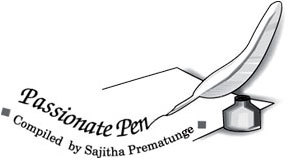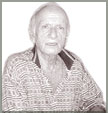
The Anglo-Normans and a new English
 by
Carl Muller by
Carl Muller
The 1066 Battle of Hastings placed William of Normandy on the English
throne; and Norman tyranny ruled while the country was portioned out
among the Norman captains.
But some bold men took to the woods and waged a predatory war. Of
these, we have the famous Robin Hood - a favourite hero of the oldest
English ballads, and who was also featured as Locksley in Sir Walter
Scott's "Ivanhoe".
It was then that a third type of literary individual surfaced: the
minstrel or troubador. Many of these singers were distinguished men,
among them even Richard the Lion Heart. The Normans were delighted with
these long, rambling love tales that are now called "metrical romances",
Of the songs of the minstrels, those of King Arthur and his knights were
the most popular.
However, as it now stands, Literature has credited William of
Malmesbury (who died about 1143) and Geoffrey of Monmouth (who died
about 1154) for introducing these Welsh songs and romances into English
Literature.
True, these men did write books, claiming them to be Histories, but
the books only contained old Celtic legends that were long familiar to
the people.
Sadly enough, there was little real English Literature. Latin was the
language of the learned.
The Saxons gave French to the common people... but slowly, English,
Latin and French became amalgamated, and there rose a new tongue that
became the speech of the nation. It was "Modern English."
In 1250, an unknown poet wrote in this new tongue - showing how verse
could be made possible:
"Summer is I-cumen in,
Lhude sing cuccu!
Groweth sed and bloweth med,
And springeth the wde nu,
Sing cuccu!
"Awe bletch after lomb,
Louth after calve cu;
Bulluc sterteth, bucke verteth,
Murie sing cuccu!"
Laughable? Oh no! Such efforts were among the starting points of
English literary effort, and verses such as this became possible and
also commanded admiration. As the language strengthened, this same poem
received a better gloss:
"Summer is coming in;
Sing loud, cuckoo!
Groweth seed and bloweth mede,
And springeth the wood now.
Sing, cuckoo!
Ewe bleateth after lamb;
Loweth after calf cow.
Bullock starteth; buck darteth.
Marrily sing, cuckoo!
In the middle of the 14th century, one "modern English" book became
very popular. It was titled "The Travels of Sir John Mandeville". People
came to believe that Sir John was a real person, like Columbus, but we
now know that the hero of the book, Sir John, was a created character,
much like Robinson Crusoe or Sherlock Holmes.
Two other writers dealt with religious and moral topics. John
Wickliffe inspired the first complete translation of the Bible into
English.
He did not actually write it, but he was also bold enough to denounce
the corruption of the medieval clergy and earned the name "The Morning
Star of the Reformation." The other was William Langland who contributed
to a group of poems that were titled "The Vision of William Concerning
Piers the Plowman".
These poems never waned in their popularity until 1600, and were
regarded as both inspirational and prophetic.
But the 14th century also saw the birth of Chaucer (about 1344). We
know little about his life.
It is said that he was the son of a London Vintner. It was with
Chaucer that English Literature found a decided place in the sun.
****
See your words in print....
Email your poems and short stories to [email protected] or
post them to "Passionate Pen", Sunday Observer, Associated Newspapers of
Ceylon Limited, Number 35, D.R. Wijewardene Mawatha, Colombo 10.
Please be patient and do not be discouraged if the publication of
your poems/short stories is delayed. Most of the poems which we received
were subject to rejection because they were too long. Please make an
effort to limit your poems to less than thirty lines and short stories
to less than 1,500 words, in order to avoid rejection. Keep reading
Passionate Pen to learn a lot from professional writers.
|
